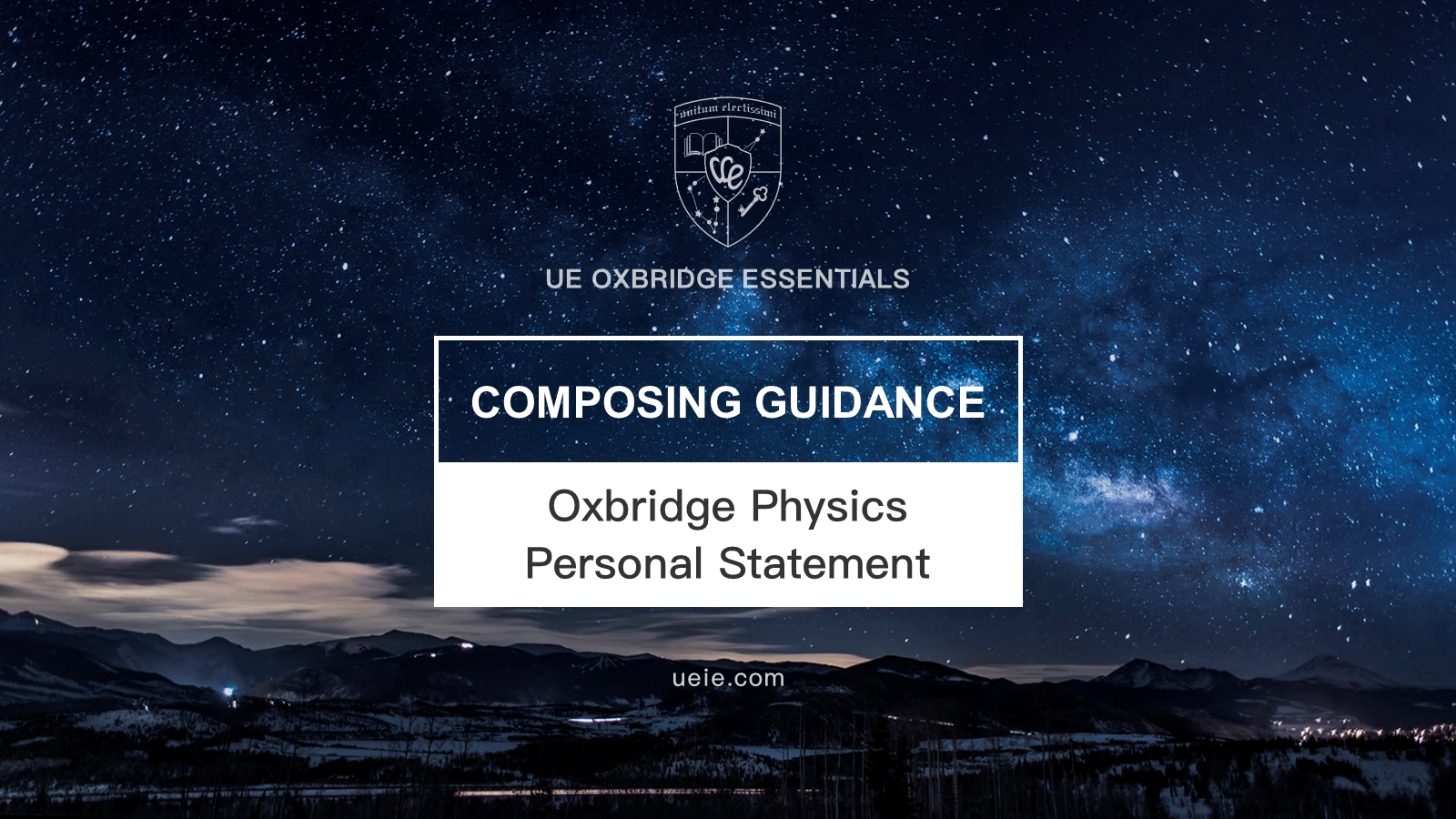Many people are fascinated by physics, the fundamental science of the universe, and some students pursue this subject at a higher level because they desire to discover the nature of truth and resolve some of its finest mysteries.
Applying to Oxbridge physics courses is like preparing to embark on a journey into the unknown. In this quest for instructional excellence, your physics personal statement serves as a compass, which leading you through the admissions process and setting you apart from other explorers.
An attractive physics personal statement is essential to the competitive application process at Oxford or Cambridge. However, this instructional blog is for you, physics college students, and Oxbridge candidates, providing tips and advice for writing the statement.
I. Being Aware of the Essence
1. What is the purpose of your physics personal statement?
The physics personal statement is more than just an essay; it reflects your passion, intellect, and dedication to physics. Which means, students applying to Oxbridge universities must be academically gifted and fascinated by the mysteries of the physical world.
2. The Oxbridge perspective
Oxford and Cambridge Universities are looking for applicants with clear reasoning skills, an understanding of essential concepts, and the ability to comprehend complex ideas. By explaining how you have shaped your hobby and prepared for the Oxbridge physics courses, then you can shed light on your enthusiasm for physics.
And it should be noted that UCAS released the FUTURE OF UNDERGRADUATE ADMISSIONS in January 2023, indicating that it will reform five aspects of the undergraduate admissions process. UCAS will be reframing the current format of the personal statement into a series of questions:
- Motivation for course – Why do you want to study these courses?
- Preparedness for course – How has your learning so far helped you to be ready to succeed on these courses?
- Preparation through other experiences – What else have you done to help you prepare, and why are these experiences useful?
- Extenuating circumstances – Is there anything that the universities and colleges need to know about, to help them put your achievements and experiences so far into context?
- Preparedness for study – What have you done to prepare yourself for student life?
- Preferred learning styles – Which learning and assessment styles best suit you – how do your courses choices match that?
However, at present, a personal statement is still required for students applying in the 2024 application cycle.

II. Crafting Your Masterpiece
1. Sparking interest
- Start with a Bang: Start with an anecdote, question, commentary, or stories such as personal experiences, historical events, groundbreaking clinical discoveries, or any story that fuels the burden of the subject. This will start by giving directions to your physics personal statement and compiling data on academic achievements, practical experience, extra-curricular engagement, intellectual curiosity, and critical thinking.
2. Looking forward
Physics Education Future Hopes:
- How does Oxbridge help you accomplish your academic and professional goals in physics?
- From a physics perspective, how have you grown and conformed to Oxbridge’s morals and rigorous academic excellence?
3. Be aware of application specifications
- Check that your thoughts are transparent and precise. Is there a flow between them?
- Use everyday language and be authentic. Avoid clichés and comprehensive references especially.
- Get revisions, which means to reread the request multiple times and ask a teacher or mentor to help.
III. Steps to Develop Your Oxbridge Physics Personal Statement
To develop the plot for a physics personal statement, the following steps must be taken:
- Academic Background
First, start by describing your physics educational background. Then, give details about your previous degrees, studies, and coursework. Finally, at some point in your academic journey, highlight any extraordinary achievements and awards you’ve received. - Research Interests
You should clearly articulate your interests and knowledge areas in physics and explain the particular areas or subjects that can interest you as a hobby. If you want to demonstrate your passion for physics, you can give examples of studies you’ve worked on or papers you’ve written. - Motivation and Passion
What motivated you to study physics at Oxbridge? What are your heritage, reports, and aspirations following Oxbridge physics courses? Describe how Oxbridge can make your long-term dreams come true in physics. - Academic Strengths
Describe your strengths and weaknesses in physics honestly. Then highlight your areas of energy and any reports that contributed to your improvement as a physicist and explain how you will deal with any areas you wish to develop similarly. - Personal Attributes
Show your unique characters and features, and describe your strong work ethic, problem-solving skills, and ability to work effectively in a team. Then explain how those features have impacted your academic or professional journey. - Collaborative Skills
Highlight your collaborative abilities and how they align with the Oxbridge physics courses. Please describe if you have participated in any organizations or extracurricular activities that demonstrate your ability to work effectively with others and show your willingness to learn from others and contribute to a dynamic learning environment. - Future Goals
Describe your long-term dreams within the field of physics and examine how Oxbridge can help you attain your goal by providing the necessary skills and information. What’s more, indicate how Oxbridge will contribute to your professional and personal development.
IV. Refining Your Physics Personal Statement
- Clarity and Logic: Make sure your physics personal statement is organized logically and that ideas flow seamlessly from one section to the next.
- Authenticity and Passion: Your genuine interest in physics should be the thread that weaves your physics personal statement together. Please focus on what really excites you about the course.
- Feedback and Iteration: Seek input from your mentors or peers, especially those who are familiar with the Oxbridge application process. Then be open to critiques and willing to revise your physics personal statement for clarity, coherence, and impact.
- Understand the course structure: Familiarize yourself with the course structure and look at the modules and subjects that appeal to you most. Now, explore the official websites of Oxford and Cambridge for detailed information on physics course.

V. A Sample Oxbridge Physics Personal Statement (With Commentary)
1. Physics personal statement sample
The varying scale of physics study is what most excites me: from the universe down to small scale particle interactions, it fundamentally governs all these areas and the many unknowns still existing, which I find fascinating. I want to develop my knowledge through further study of physics to be part of modern day research, which has such a huge impact on our lives.
Alongside my studies, I have been involved in many projects in and out of school to further my interest in physics beyond the A Level course, most recently on Oxford’s UNIQ Physics summer school. In advance of this, I read Feynman’s ‘Six Not-so-easy Pieces’. While I found many of the concepts discussed initially challenging (mainly time dilation, length contraction and curved space), I enjoyed Feynman’s clever analogies to explain these concepts, such as through bugs and hot plates. Study of these topics at Oxford developed my understanding of and interest in relativity, with the opportunity to have intellectual conversations with leading academics being most beneficial and enjoyable.
Using the Michelson interferometer to measure sodium emission lines was a session that I particularly enjoyed due to experiencing the university approach to practical work and using equipment that I had only read about, and wouldn’t have otherwise had the opportunity to use. I’ve also read ‘The Last Three Minutes’, in which I found Davies’ links between astro-, particle and quantum physics particularly interesting. However, one of the most interesting points for me in both books was not the content but by how much our knowledge has advanced during my lifetime, with discoveries such as the observation of gravitational waves (which Davies had only predicted), especially as this was performed on a somewhat enlarged version of equipment I have now used.
This year I was selected to join Project Horizon, my school’s near-space programme. Over the year, we planned the launch of a payload into the stratosphere, where I led a small team of engineers building and soldering the flight computer and the payload. We had a number of sensors to capture data including temperature, humidity and UV and IR intensity, which was interesting to analyse and compare to expected trends. The payload reached 37864m, capturing spectacular footage from three cameras, which we are hoping to use in a series of outreach lessons in local primary schools. Over the past year I have also mentored a Y8 pupil in physics, as well as assisting in one lower school physics class every week as a STEM Ambassador. This opportunity to have my own basic physics knowledge questioned was extremely beneficial, while also giving back to my school community.
I’ve learnt Mandarin Chinese for the last 5 years and see this as a great benefit to my future career prospects due to the global nature of modern science. Playing the piano since infant school, now at ABRSM Grade 6 level, shows my commitment and I am also proven to be a strong leader: being Vice-Captain of School I work with the Senior Leadership Team to ensure the smooth running of the school on a weekly basis, while also leading and organising the largest RAF Air Cadet section in the country as the Cadet Warrant Officer, and being part of a Cub Scout leadership team to run a weekly programme of activities for 8 to 10 year olds.
These all show my willingness to take up the leading role of a university society or in the local community, as well as my ability to communicate with all ages, from young children to peers and staff, and to be adaptable and innovative when things don’t go to plan: all making me suited for group work and the practical side of the course. Overall, I am looking forward to furthering my physics ability at university and believe I display inter-personal and time management skills essential for this challenge, with the prospect of a career in the aviation or space industries adding to my motivation to study the subject.
2. Commentary on the Sample Statement
- The beginning is engaging and succinctly states the applicant’s views on physics.
- The inclusion of literature and participation in activities substantiates the applicant’s claim of active involvement in the subject.
- A reference to practical experience and collaborative roles demonstrates the applicant’s readiness for laboratory work and Oxbridge’s tutorials.
- Linking future aspirations with the Oxbridge training device develops a full-circle narrative.
VI. Conclusion
Summarize your physics personal statement by emphasizing your love of physics, suitability for Oxbridge physics, and commitment to academic excellence. Make sure you end positively and express your enthusiasm for studying at Oxbridge.
Be concise, well-structured, and persuasive in your physics personal statement. Follow the suggestions provided by Oxbridge and UCAS, proofread your announcement carefully before submitting it. Wish you success with your application!


